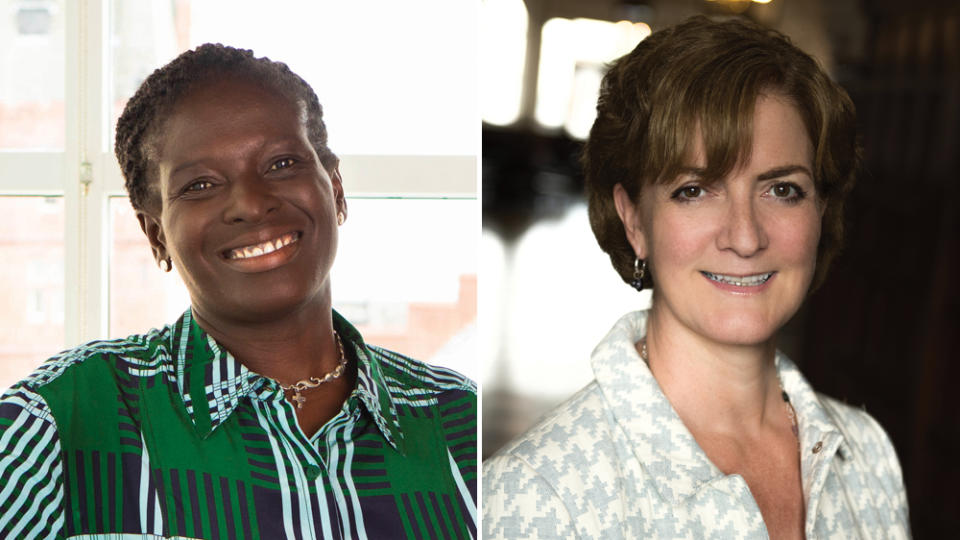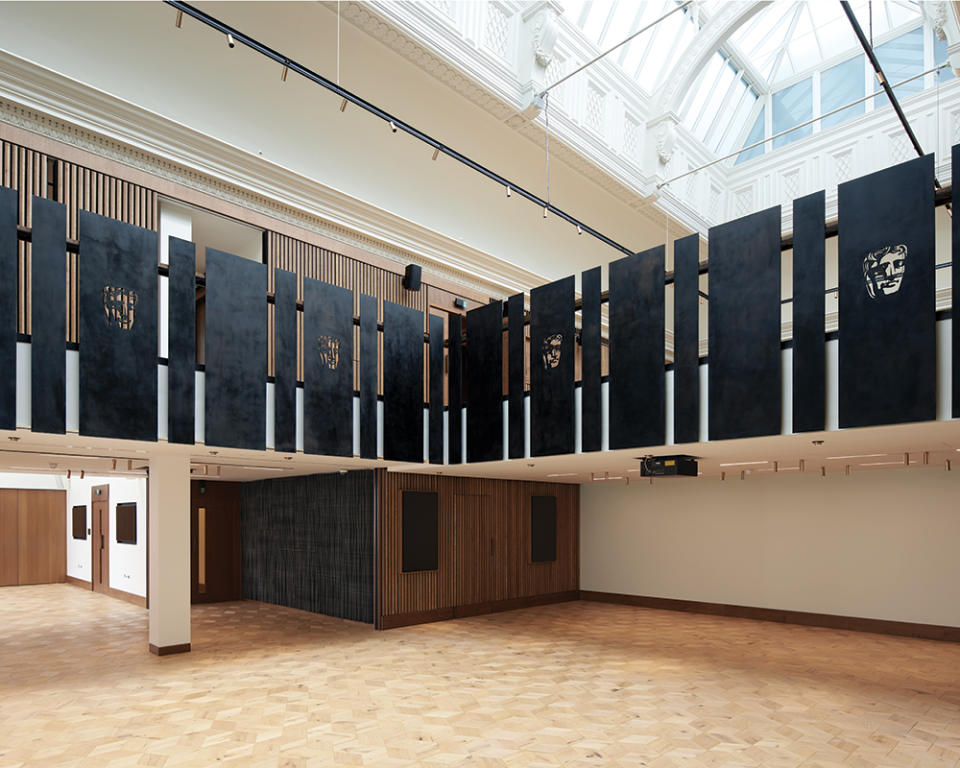Building a Better BAFTA: How the Organization Is Transforming to Become More ‘Open and Inclusive’

The new look of the British Academy of Film and Television Arts is more than just a fresh coat of paint. The academy, which presents the U.K.’s premier film, television and gaming industry awards, is in the process of a major makeover and redevelopment — inside and out.
BAFTA was formed in 1947 as the British Film Academy, the result of the efforts of key figures — led by filmmaker Alexander Korda, whose “The Private Lives of Henry VIII” (1933) was the first British film nominated for a best picture Oscar — in the industry to promote and develop British film as an art form. David Lean was appointed the academy’s first chair, and the first awards ceremony took place in 1949. Over the years, the film awards gained in global prominence, and in 2001 they moved from their traditional April slot to February, ahead of the Oscars. Since then, the BAFTA Awards have served as a bellwether for the Academy Awards. But the recent past has been a turbulent period for the organization, beginning with the #BAFTAsSoWhite scandal during the 2020 nominations, where there were no nonwhite nominees in the acting categories. The backlash led to a groundbreaking, in-depth awards review, commissioned by BAFTA chair Krishnendu Majumdar. It began as a response to the lack of diversity in the nominations but expanded to more than 120 changes to BAFTA’s voting, membership and campaigning processes.
More from Variety
How Many Movies Can Oscar and BAFTA Voters Watch Over Thanksgiving?
Fiona Lamptey, Colin Trevorrow Among BAFTA Breakthrough 2021 Jurors
The review was published in September 2020 and was praised across the industry, but further struggles were in store for the organization. In March 2021, actor-producer Noel Clarke was given the BAFTA Outstanding British Contribution to Cinema Award — an honor he accepted as part of a televised ceremony. However, following sexual misconduct allegations brought against Clarke in a bombshell report by The Guardian, BAFTA — facing criticism for having gone ahead with the ceremony despite prior knowledge of untoward behavior — withdrew the award and suspended his membership.
Since then, the organization has been in a period of regeneration, in more ways than one.
Alongside the findings of the review, which are being implemented, CEO Amanda Berry tells Variety that “special awards” like the outstanding British contribution award and the BAFTA Fellowship are being “thoroughly and thoughtfully” examined in terms of what they represent and celebrate.
“We’ve also been looking at how we can better communicate our expectations of behavior and the values that underpin our work,” Berry adds. “We want BAFTA to be an open and inclusive place and for the industry volunteers who join our committees and juries, as well as our wider membership, to understand and share our values. We also want to continue to promote positive and meaningful industry change. Our work with other organizations such as the BFI on bullying, harassment and racism-prevention guidelines continues.”
Sara Putt, deputy chair of the academy and chair of the television committee, tells Variety: “I think [BAFTA] has changed, and is changing, and will continue to change. I think the review was very much about taking a long look at where we were, and how we could be better and how we could future-proof ourselves.”

Rawcliffe: iTV; Putt: Genevieve Stevenson
Physically, the hallowed BAFTA headquarters at 195 Piccadilly in London can’t change its facade, being a historically listed building. However, the interior has gone through a state-of-the-art sustainable and accessible retrofit costing £33 million ($47.4 million), per figures published by Benedetti Architects, which is in charge of the process, overseen by BAFTA head of property Pauline Campbell.
For members and visitors accustomed to the old headquarters, the physical changes are pleasantly startling. What used to be the David Lean Room events space is now rebranded as the Ray Dolby Room (with Lean receiving a titular boardroom instead), and physical sets and props have been replaced by a sophisticated projection system. What was once the members’ bar is now the Creative and Future Galleries, a multipurpose space for learning and new talent activity.
“A key priority for the redevelopment of 195 has been making sure the building is as welcoming and accessible as possible too,” Berry adds. “For example, we have consulted disabled members of the industry, and they have been some of the first groups to tour the building and provide feedback, which I’m delighted to say has been positive. It’s not just about the physical space either. We’ve also been consulting with disability specialists to ensure our programs are accessible and inclusive to all, and that includes people with invisible disabilities or those that are neurodiverse too.”
The Princess Anne Theatre now has Dolby Atmos and Dolby Vision audiovisual systems in place. It retains its 227 seats but with a difference — 17 of those spaces are wheelchair accessible. Given the ever-present threat of COVID-19, there is also a new air displacement system, ensuring constant fresh air. The 41-seat Run Run Shaw preview theater, with six accessible spaces, is at a new location within the building and also has bespoke audiovisual equipment.
The architects raised the roof, literally, and added a floor — it’s now the new members area — named after Oscar-winning “Gandhi” filmmaker and “Jurassic Park” actor Richard Attenborough. While the portraiture throughout the building reflects the diversity of winners and nominees, a striking feature of the Attenborough space is the portraits of those selected for BAFTA’s Breakthrough, Elevate and other talent initiatives. Members will be able to scan and link to information about the participants.
“The awards are just the very visible tip of the iceberg in terms of the unique work that BAFTA does year-round,” says Berry. “We’re particularly focused on helping talent from underrepresented groups to access careers in film, games and television with initiatives such as Breakthrough, which supports emerging talent in the U.S. and India as well as the U.K.”
A stated aim of the BAFTA redevelopment is to provide 80,000 people a year with the tools to pursue a career in film, games and television.
“We see 195 as an investment in future generations of talent,” says Berry. “It is our London hub and a center for creative excellence. The increased space and dramatic expansion of our programs and events means quite simply that we can discover and nurture even more talent. I believe that talent is everywhere, whereas opportunity is not and we want to change that.”
The BAFTA talent initiatives are particularly welcome at a time when the U.K. production industry is booming but there is a critical shortage of personnel.

Courtesy of BAFTA/Rory Mulvey
“We all know there are huge skill shortages in areas of the industry,” says Putt. “It’s about looking where the BAFTA can help to make sure that those from underrepresented groups are not hitting glass ceilings, are getting through, getting in front of the right people and getting those opportunities.”
Ade Rawcliffe, group director of diversity and inclusion at U.K. broadcaster ITV, also serves as chair of the BAFTA learning and new talent committee. “We use the BFI Diversity Standards now as a condition for entry [to the BAFTA talent schemes],” Rawcliffe tells Variety.
“It’s about how we can use our platform to change the industry, and it’s really, really important how we use our voice in the industry.”
One of the schemes, BAFTA Crew, has a roster of 1,500 industry-ready crew members. Tim Hunter, BAFTA executive director for learning, inclusion, policy and membership, tells Variety: “We’ve done all the work to ensure that they’re talented, and nobody needs to really worry that they’re not going to be up to the job. We’ve done the work to make sure that they are diverse and supported in any kind of access requirements or anything else that they need, and to build their skills. So those people are ready to work now.”
BAFTA also helps introduce talent to potential employers, primarily through roundtables, in an environment that aims to convey a sense of trust and security, Hunter says, adding that the organization is creating a “virtuous circle” where information collected as part of the diversity requirements is used to enhance its programs.
Another stated goal of the review — to add 1,000 underrepresented individuals to the BAFTA ranks over two years — is on track, the organization says, with one-third of the target achieved.
As for the film awards, the long-listing process and the “conscious voter” videos that have been implemented to help level the playing field have seen members who cast ballots watch more movies, resulting in 50 films nominated in 2021 compared with 39 in 2020 and a surge in the number of women directors nominated.
Regarding the long-standing debate around merit versus representation, Rawcliffe says, “It started out being a review of our awards process for the film awards, but it ended up being ‘What is the purpose of BAFTA, and what are our values?’ And I would say that representing our audience and representing the country is a key value of BAFTA. So I would not separate them. I would say that representation makes up the definition of excellence; I don’t see these things as being mutually exclusive. They are things that we stand for.”
Meanwhile, the physical redevelopment process that Berry describes as the “most ambitious project in BAFTA’s 75-year history” is culminating in the doors of 195 reopening in a series of soft launches. Philosophically, “the work of the review is ongoing, but this impact is very promising,” Berry says.
Best of Variety
Sign up for Variety’s Newsletter. For the latest news, follow us on Facebook, Twitter, and Instagram.

